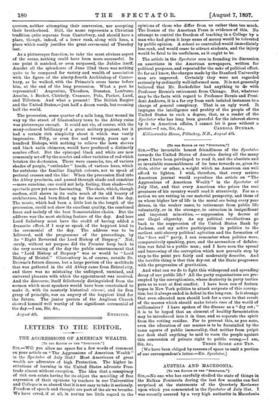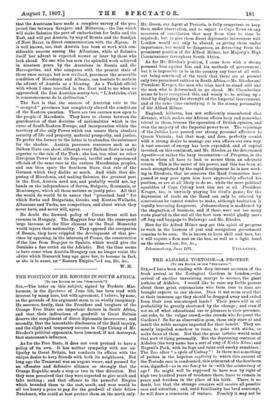AUSTRIA AND MACEDONIA.
[To TEN EDITOR OP THE " SPECPATOR:1 Sin,—No one who has carefully studied the state of things in- the Balkan Peninsula during the last few months can feel surprised at the statements of the Quarterly Reviewer upon which you commented in the Spectator of July 31st. I was recently assured by a very high authority in Macedonia
that the Austrians have made a complete survey of the pro- jected line between Sarajevo and Mitrovica,—the line which will make Salonica the port of embarkation for India and the East, and will put Austria, by way of Bosnia and the Sandjak of Novi Bazar, in direct communication with the .2Egean. It is well known, too, that Austria has been at work with con- siderable success among the Albanians, while at Salonica itself her advent is expected sooner or later by those who look ahead. No one who has seen the splendid work achieved in nineteen years by the Austrians in Bosnia and the Herzegovina, and who compares with the present state of those once savage, but now civilised, provinces the miserable condition of Macedonia and Albania, can hesitate to acclaim the advent of Austria as a blessing. As a Turkish official with whom I once travelled in the East said to me when we approached the first Austrian sentry-box, " L'Antriche, c'est le commencement de la civilisation."
The fact is that the success of Austrian rule in the "occupied" provinces has completely altered the conditions of the Eastern question. There are two courses now open to the people of Macedonia. They have to choose between the gratification of that doctrine of nationalities which is the curse of South-Eastern Europe, and incorporation within the territory of the only Power which can assure them absolute security of life and property, material prosperity, and justice. To prefer the former to the latter is to abandon the substance for the shadow. Austria possesses resources such as no Balkan State can show, although every Balkan State is vastly superior to the rule of the Turk ; she has, too, what no other European Power has at its disposal, tactful and experienced officials of the same race as the various Macedonian peoples, and can thus spare the Southern Slays that rule of the German which they dislike so much. And while thus dis- posing of Macedonia, and making Salonica the greatest port in the East, Austria need not, and probably would not, lay hands on the independence of Servia, Bulgaria, Roumania, or Montenegro, which all those nations so justly prize. All that she would do would be to annex that "promised land" for which Serbs and Bulgarians, Greeks and Koutzo-Wallachs, Albanians and Turks, are competitors, and about which they never have, and never will, agree.
No doubt the forward policy of Count Benet still has enemies in Hungary. The Magyars fear that the consequent large increase of the Slav element in the Dual Monarchy would injure their nationality. They opposed the occupation A Bosnia, they have crippled the development of that pro- vince by opposing, in the interests. of Fiume, the construction A the line from Bugojno to Spalato, which would give the Bormiaks a fine outlet on the Adriatic. But the time seems to have come when Austria-Hungary can no longer resist the advice which Bismarck long ago gave her, to become in fact, as she is in name, an "Eastern Empire."—I am, Sir, Sec.,
W. IL



































 Previous page
Previous page